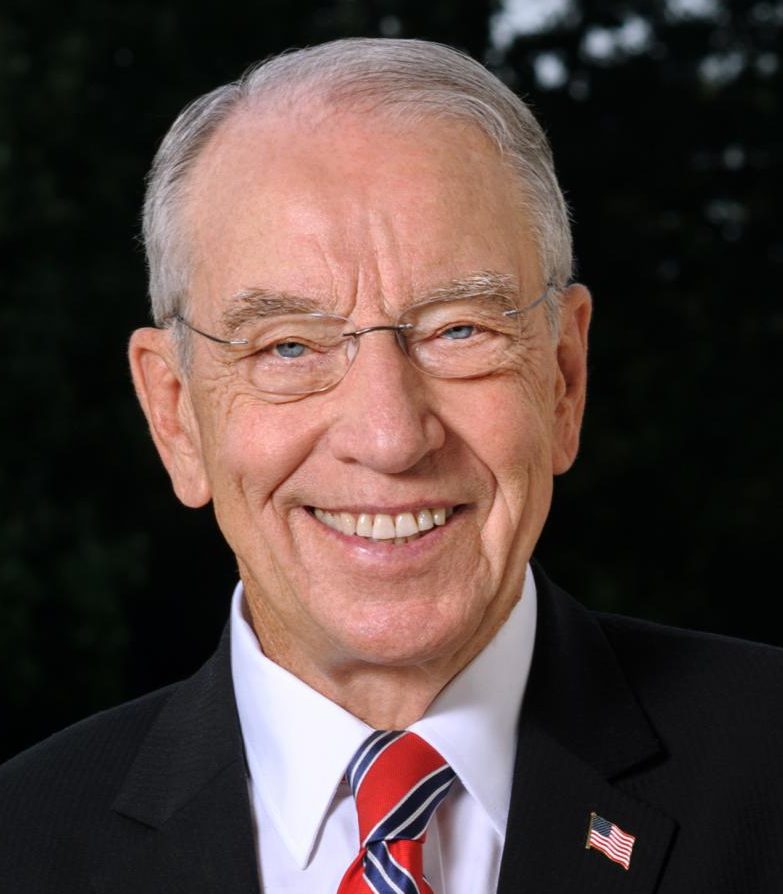Sen. Chuck Grassley (R-Iowa) is pressing the Bureau of Alcohol, Tobacco, Firearms and Explosives (ATF) for answers after legally protected whistleblower disclosures revealed the agency failed to fully investigate criminal misconduct among ATF employees, including gun trafficking and drunken assault.
“The ATF exists to ensure the safe and lawful use of firearms and alcohol, which ATF’s own employees have apparently abused. How can Americans have confidence in the ATF when it fails to take instances like this seriously? I’m deeply concerned the ATF took a lax approach to investigating its employees’ significant violations of the law,” Grassley said. “This is more than an HR problem; it’s a mission failure.”
According to an ATF memo, after discovering in 2017 that an ATF investigator had illegally trafficked numerous firearm parts from the U.S. into Mexico over the course of several years, the ATF failed to fully investigate the employee’s illicit activity. This employee admitted to purchasing and trafficking U.S. firearm parts to distribute to at least three people in Mexico, including a police officer, a state judicial official and a former member of the Mexican military who may have had cartel links. Further, in 2019, the ATF allegedly neglected to take any disciplinary action against a Mexico-based ATF supervisory special agent arrested by Mexican authorities for assaulting another man while highly intoxicated. Grassley is making internal ATF records public and asking ATF to provide additional records related to these employees’ misconduct and the reasoning behind the agency’s limited investigations.
Read Grassley’s full letter HERE and below.
The Honorable Steven Dettelbach
Director
Bureau of Alcohol, Tobacco, Firearms and Explosives
Dear Director Dettelbach:
Legally protected whistleblower disclosures to my office have raised concerns with respect to the failure of the Bureau of Alcohol, Tobacco, Firearms, and Explosives (ATF) to hold its employees accountable for engaging in criminal misconduct. The disclosures include allegations and documents evidencing that the ATF failed to fully investigate an ATF employee working in Mexico who allegedly admitted to illegally trafficking firearms from the U.S. into Mexico for years. The allegations and documents also show that the ATF separately failed to impose any disciplinary or corrective action against an ATF Supervisory Special Agent who allegedly engaged in drunk, disorderly misconduct and was arrested for assaulting a man while assigned in Mexico.
According to ATF documents, in 2017, ATF Investigator Jose Luis Meneses (Meneses), a foreign national, was assigned to the ATF office within the U.S. Consulate in Tijuana, Mexico, and admitted to engaging in trafficking numerous firearms for multiple years; however, the ATF declined to initiate a full investigation. On May 9, 2017, Craig Saier, the then-ATF Attaché for the Mexico Country Office (ATF Mexico), wrote an email to William Duncan, the then-State Department Deputy Chief of Mission for Mexico City, that transmitted a signed memo titled “Notification to Government of Mexico of ATF Investigator Involved in Firearms Trafficking” (“ATF memo”) that included information about the ATF’s interrogation and discovery of Meneses illegally trafficking firearms into Mexico. According to the ATF memo, the ATF received a tip from a firearms dealer about suspicious purchases made by Meneses. However, it’s been alleged that the memo was never sent to the Government of Mexico, and the scope of Meneses’s trafficking activity was not fully investigated.
The ATF memo provides that on March 14, 2017, the Regional Security Officer of the State Department for the Consulate of Tijuana, an HR representative, and the ATF Deputy Attaché in Tijuana interviewed Meneses after ATF Mexico received a tip that Meneses had trafficked firearms into Mexico. In the interview, Meneses admitted that for multiple years he ordered various firearms parts from the internet and retail stores in the U.S. to traffic into Mexico. Meneses claimed that he purchased enough firearm parts to complete eight AR-15 style rifles that he would traffic to Mexico. According to the memo, Meneses admitted that he would have the firearms parts shipped and delivered to a PO Box registered to his wife that was located in San Diego, California, where he would pick up and illegally transport the parts to Mexico. On March 16, 2017, agents from the ATF San Diego Field Office obtained and executed a federal warrant to search the PO Box and intercepted packages containing AR-15 weapon parts as well as high-capacity magazines for .223 rifle ammunition.
Meneses further admitted that he purchased and trafficked firearms for at least three people in Mexico: his brother who was a police officer, a state judicial official, and a man identified as “Romero,” a former member of the Mexican military. The memo states that “Romero” would complete the AR rifles in Mexico to further sell and traffic the firearms to others in Mexico. According to media reports at the time, it was widely known that Mexican drug cartels would recruit current and former Mexican military personnel to be enforcers to carry out violent attacks on behalf of cartels.
The whistleblower disclosures to my office indicate that the full extent and scope of Meneses’ criminal activity is unknown because a full criminal investigation into his alleged illegal firearms trafficking network or associates wasn’t done. For example, according to the ATF memo and whistleblower disclosures, ATF did not investigate whether Meneses had ties to Mexican cartels, whether “Romero” was connected to the cartel, the full extent of Meneses’s trafficking network, whether he had co-conspirators both in the U.S. and Mexico, or if other ATF employees were complicit or involved in his criminal activity. Whistleblower disclosures indicate that Meneses used his ATF issued devices and diplomatic vehicle to conduct some or all of his firearm trafficking into the U.S. because his diplomatic plates would not subject him to searches at the U.S. and Mexico borders. The ATF could have run a trace on Meneses government phone and GPS location data for the vehicle but, according to allegations, they did not. If the ATF maintains possession of evidence contradicting these allegations and the ATF memo, please provide them immediately.
Despite Meneses admitting to illegally trafficking firearms while employed by the ATF, the ATF’s memo downplays Meneses’s criminal activity by treating it as a Human Resources administrative matter. For example, the memo provides that the consequence for admitting to engaging in this activity merely was that “Menses was placed on administrative leave on March 14, 2017.” The memo further states that “following an administrative investigation, on April 10, 2017, his employment at the U.S. Consulate in Tijuana ended.” According to allegations, the ATF terminated Meneses “without cause” and ultimately paid him a severance package after the termination.
In addition to the allegations above, according to a 2019 police report provided to my office, Supervisory Special Agent (SSA) Jose Ruiz became highly intoxicated after heavy binge drinking while stationed at ATF Mexico. SSA Ruiz then, according to the report, engaged in disorderly conduct and pushed a man off a ladder, causing significant injuries. SSA Ruiz was arrested and taken to jail for his alleged attack on the man, and emergency services had to transport the individual to the hospital. It is alleged ATF Mexico performed an extensive search and expended government resources to locate SSA Ruiz, and they discovered he had been arrested and placed in jail.
An ATF Internal Affairs (IA) investigation form provided to my office also acknowledged the incident. It provides that ATF IA were investigating allegations of “misconduct by drinking alcohol and having an accident and causing someone to fall off a ladder and getting hurt.” However, it failed to mention that the police were called and SSA Ruiz was arrested and spent the night in jail. It is alleged at the conclusion of the ATF IA inquiry, SSA Ruiz was cleared of all wrongdoing, faced no consequences or disciplinary actions for allegedly assaulting the victim and for being arrested, and Ruiz continued in his management position.
If these protected disclosures are true and accurate, they illustrate a failure by the ATF to hold its employees accountable for criminal misconduct and fully investigate potential connections between firearms traffickers within the ATF’s own ranks and Mexican cartels. Instead of targeting lawful American taxpayers who exercise their fundamental Second Amendment rights, the ATF needs to hold its own employees accountable and take the steps necessary to fully investigate their criminal activity. The ATF’s apparent failure to police itself breaks faith with the American people.
So that Congress may conduct objective and independent oversight concerning the ATF’s efforts to hold its employees accountable, prevent transnational criminal cartels from using ATF employees to traffic firearms from the U.S. into Mexico, and sufficiently vet its employees, please provide answers to the following no later than October 18, 2023.
In regard to ATF Investigator Meneses:
- Provide all records relating to the administrative investigation into Meneses.
- Did ATF, or another agency, investigate Meneses’s alleged co-conspirators and whether other ATF employees were complicit or involved in his trafficking? If so, provide all records. If not, why not?
- Provide all records related to Meneses allegedly trafficking firearms from the U.S. to Mexico.
- Provide all records related Meneses’s use of his ATF issued vehicle and devices to allegedly traffic firearms from the U.S. to Mexico.
- Provide the personnel file for Meneses and a description of all disciplinary conduct imposed upon him.
- Why did ATF Attaché Saier not transmit the May 9, 2017, memo to the government of Mexico to notify them that Meneses allegedly engaged in firearms trafficking?
- Was Meneses terminated “without cause”? If so, why and was Meneses paid a severance package? What amount did he receive?
- Did the ATF investigate Meneses for any connections with transnational criminal organizations operating firearms smuggling networks in the U.S. or in Mexico? If so, provide all records. If not, why not?
- Has the ATF investigated any ATF employees for any connections with transnational criminal organizations operating firearms smuggling networks in the U.S. or in Mexico? If so, provide all records.
- What is the process, procedure and policy for screening the background of foreign nationals employed by the ATF in Mexico? Was that process, procedure and policy followed for Meneses? Provide all records.
- Were any concerns, to include derogatory information, raised during Meneses’s background screening before being employed by ATF Mexico? If so, what? Provide all records.
- Was Meneses subject to additional background screening while employed by the ATF? If so, please describe. If not, why not?
- Did Meneses have a security clearance? If so, at what level? Please provide his SF-86.
- Given his connection with “Romero” formerly of the Mexican military, has the ATF referred Meneses or information on “Romero” and the other coconspirators to other U.S. law enforcement agencies or Mexican officials for investigation? If yes, provide records of the referrals. If not, why not?
- Following his employment with the ATF:
- Were any firearms traced in Mexico linked to Meneses? Provide records of all firearms traces and their result.
- Was Meneses identified or investigated by the government of Mexico or other U.S. law enforcement agencies for engaging in criminal activity?
In regards to SSA Ruiz:
- Why did ATF OIA not impose any disciplinary action?
- Was OIA aware that SSA Ruiz was allegedly arrested and imprisoned by Mexican authorities for pushing a Mexican national off a ladder? If not, why not? If yes, why was this information absent from the ATF OIA document?
- With respect to the ATF’s efforts to locate SSA Ruiz while he was allegedly imprisoned in Mexico, please provide a break down of the hours, manpower, GPS traces, and other efforts spent by ATF and the cost to the taxpayer.
- Did SSA Ruiz or the ATF pay for the Mexican national’s medical bills related to SSA Ruiz allegedly pushing him off a ladder? If not, why not? If yes, provide records of how much was paid and whether taxpayer dollars were used for the payment.
















